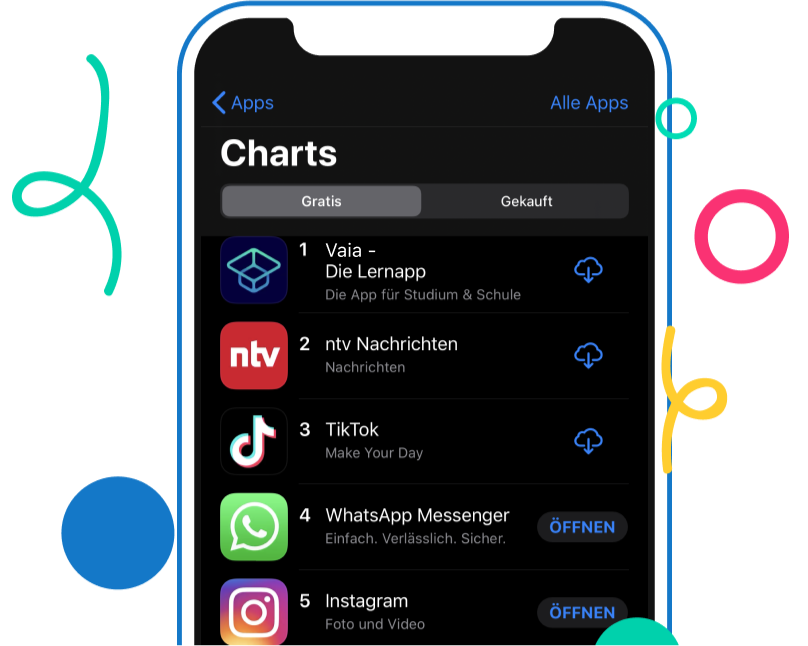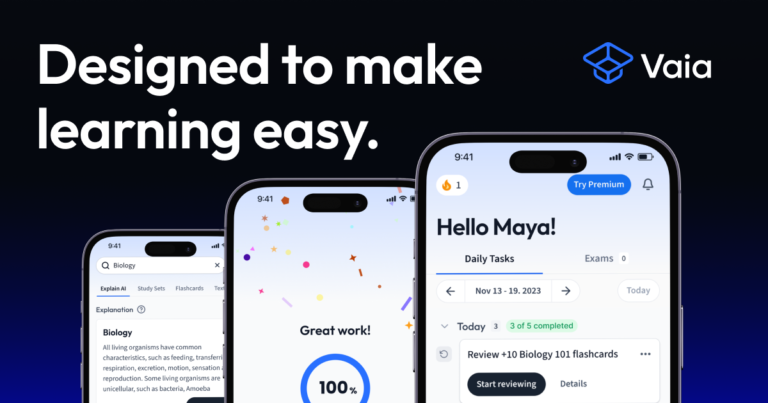Stay Focused – The Meaning of Focus
You keep telling yourself to focus on the task at hand, but do you ever consider what staying focused actually means? Sure, it’s concentrating on the task and engaging with it on an active cognitive level. But it also implies reading, assessing, pondering, dissecting, memorizing, and connecting the task to your existing knowledge and finding ways to solve it or apply it to other tasks. Hey … did you just check your phone again?
When dealing with anything that requires concentrated effort, we tend to zone out, disappear into our own thoughts, or respond to the call of social media. The fact is that there is simply too much noise around us, and we’re bound to get distracted more often than not. Let’s think of that noise. It’s not just loud and startling – it’s also the white noise of busy lives, constant online presence, and our long days. Your brain needs rest from many things, which is why it’s so easily lured into the trap of distractions.
The bad news is that the older we get, the more difficult it is to stay focused for extended periods of time. But let’s not despair yet. Just as many ways lead to Rome, there are many ways to stay focused on your tasks.
To Find Ways to Stay Focused, Focus on This
Consider how you spend your time on a daily basis. How much of your work time is actually productive? It’s not enough to just sit in a chair, clock in, and stare into space for the next eight hours. Instead, it’s the tangible result of those hours that counts.
To concentrate on something, you have to train your brain. And you can start by owning your time. Start with tracking your time for a while and see what exactly is eating it. And by that, I mean literally every little thing. If you spend 15 minutes scrolling on social media, log that. You don’t have to show it to anyone and don’t take it as a personal attack on yourself. Think of it as an experiment. After a few days of monitoring your activity, you will be able to gauge what diverts your attention from working and studying.
Once that is done, you’ll get an idea of who the real culprits are. Now, let’s fight them!

Tips to Stay Focused When It Really Counts
There are those days when you know you have to get the job done (ahem, exams are coming!). On those days, I heartily recommend a few tips on how to keep your head in the game:
- Set your daily goals. There’s nothing wrong with a well-devised to-do list. Set reasonable goals, and not stuff like “today I’m gonna learn 270 pages of the mechanical bioproduction of detergents” (unless you love that kind of stuff). Divide your goals into sizeable pieces and tackle one at a time.
- Use your productivity peaks. Statistics show that we are most productive in the morning. To ride on this wave, set up a regular, energizing morning routine. Get up, do some stretches or fitness and make a nutritious breakfast (coffee is not breakfast, although it goes great with it). As soon as you’re finished, get into your work zone.
- Speaking of work zones, set up your workspace. This needs a bit of foresight, so make sure that you have a quiet place in your house where you can work. Always do your hardest tasks there, as the associative power of your brain will know it’s time to oil the gears and start rolling. If there is no such place in your home, try the local library or even an empty classroom at your university.
- Don’t multitask. Even if you think you’re good at it, chances are, you’re stretching yourself. Switching between multiple tasks is not as productive as we may think. It’s time-consuming because the brain can take up to 30 minutes to redirect attention and energy from one thing to another. Once you’ve found your focus, don’t squander it over an idea of accomplishing more things at once.
- Think hard about focusing. You’ll be zoning out for sure; that’s inevitable. What matters is how you manage that. When you catch yourself reaching for that phone, new tab, or a snack, make a conscious effort to focus on your task again. Check in with yourself where exactly you drifted off, see what the last thing you remember is, and restart from there.
Major Criminals Against Staying Focused
I’m talking about social media here, of course. The only way to be less distracted is to get rid of their input. OK, let’s say you’re studying and your phone buzzes next to you.
You have two options:
- You will reach for it to check the notification. And since you’re there, you might as well respond. Oh, and look, Sarah’s got a new profile picture, better like that. It seems like Jonathan has posted several new stories; let’s look. Oh, he’s in Spain now. And on it goes until you realize you’ve just spent 20 minutes on social media and achieved nothing.
- You will be wondering what that notification was about and definitely not thinking about work.
Put your phone away while you’re working or studying. Just do it. Switch off all your notifications (DMs, Instagram, TikTok, Gmail – whatever it is that is bound to take your attention away).
OK, now your phone is away, but the story continues. Here comes your internet browser, where you can also check all those notifications. Get yourself a nice browser extension (I suggest BlockSite) that will block all the websites that tend to devour your time and attention once you open them. You can even set these tools up to redirect you to certain pages whenever you try to open suspicious ones. Use this to remind yourself what you should be doing instead and take control of your work.

What about Emails and Meetings? Staying Focused at Work
Colleagues and meetings can take up a lot of your work time. That’s why it’s crucial to use the rest of it productively, but of course, you’ll still have that distractive itch. Checking your email is just one of those work things that we all suffer from. After all, what if somebody needs us? Like, right now?
Don’t fall into the email trap. Remember that whatever may be in that email, it can wait for your break when you can give it your full attention. People used to work just fine without all the instant messaging – the world didn’t fall apart, and neither will your correspondent. Besides, if it’s really that urgent, they will call (if anyone does that these days anyway).
‘I Can’t Stay Focused!’ You Cry? Consider These Tips
If you’ve got rid of your distractions but still cannot focus, try some of these tips:
- Work in short bursts. You can start with thirty devoted minutes and plan a break after you’re done. Take a look at what you’ve achieved to motivate you further. During the break, you can check your socials and grab a snack before turning your attention back to your work.
- Feeling snacky? Sometimes we reach for snacks out of boredom rather than hunger. Try to find the root cause behind your belly rumbles. If you’re hungry, you won’t be too picky about what you want to eat. In that case, make sure you have bigger meals before your study sessions so that you don’t have to nip into the kitchen every 15 minutes for a ten-minute-long sandwich-making session. If you have specific wishes for food, you’re probably just bored by your books. In this case, work on actively regaining your attention and have nutritious snacks like nuts and fruits nearby.
- Coffee is not always your best friend. Don’t get me wrong; I am a big supporter of a strong morning coffee. It’s a great way to become mindful of your surroundings and ground yourself. But don’t reach out for too many coffees as a pretext for distraction. Too much coffee spikes your cortisol levels, making you tense, cranky, anxious, and certainly not productive.
- Practice mindfulness. When your attention drops, do simple mindfulness exercises, like taking a deep breath and focusing on things you can see, hear, and taste. To focus on your studies, try comprehending what you’re reading and committing it to memory.
- Boost your brainpower. Take brisk walks when you feel like dozing off, or try short cardio workouts or stretches. Use your distractedness as a way of getting fit both in body and mind. Exercise increases serotonin, raises your perception levels, and makes you as sharp as a knife when you get back to your studies.
Take It a Step Further and Stay Focused on What You Want
At the end of the day, staying focused is best reinforced by remembering your goals. It’s likely your final destination needs dedication and diligence, and knowing what you want will keep your head in the game. Still, if you find yourself struggling, try implementing some of these more comprehensive changes:
- Work on your health and fitness. Adopt a healthier lifestyle, including at least 150 minutes of aerobic activity per week. Be it jogging, cycling, brisk walking, energetic cleaning (great for stress relief), or some heavier exercises, your body will be awakened to changes and make you sharper. Try to eat healthy foods in a balanced diet, too. Include lots of lean proteins, complex carbs and fibers, and some healthy fats. Reduce your fast-food intake as well as alcoholic and sugary drinks. Ditch any extreme dieting as it will make you tired and grumpy. Wake your mind by waking up your body, and you’ll see how your focus improves.
- Practice yoga. Meditation, mindfulness, sun salutations – all of these have great benefits for the mind. You’ll build bodily strength and also increase your awareness of your surroundings, which will, as a result, improve your studies.
- Try cognitive brain training. Some great apps like CogniFit can help you train your brain. These apps have a series of minigames that help you stay focused, make logical conclusions, and spot patterns faster.
- Create a weekly review to track your progress. At the beginning of every week (better yet, on Sunday evening), create a to-do list and organize your week according to priorities, the complexity of the tasks, and your mental and physical availability (e.g., using mornings to work on the hardest tasks). At the end of the week, check your progress and evaluate what went well and what needs more work. Plan changes in the next week to improve your productivity. Enforce a lasting habit on yourself for long-term benefits.
- Don’t beat yourself up, and get plenty of rest. Remember, each big goal is a marathon, not a race. There are times when you need to slow down and take breaks. Listen to your body and honor its needs, or else you’ll run the risk of burning out. The best concentration comes when we are well-rested. When you start feeling miserable, take that blessed nap and aim for a consistent sleep schedule to reap the most benefits from your REM phase.
Final Remarks on How to Stay Focused
In this day and age, it’s really easy to get distracted by several things – noises, bodily needs, phones, and computers. Staying focused is an ever-lasting challenge, but it is achievable through some simple tricks:
- Avoid obvious distractors. Switch off your notifications and put the phone away when you’re working.
- Do not respond immediately – most things can wait a few hours.
- Define your daily goals and work in reasonable chunks.
- Take regular breaks to recharge. Do some stretches or go for a walk when you get tired.
- Adopt a healthy lifestyle.
- Make a conscious effort to stay focused. When you start getting lost in your thoughts, retrace your steps and force yourself to concentrate.








